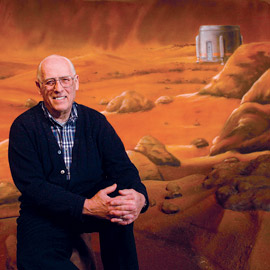A Fabulous Time to Be Alive
Professor Emeritus Celebrates New Discoveries in Space
Though Karl Krienke retired in 1997 after 44 years in the Seattle
Pacific University classroom, he still seeks to turn over every
stone in the cosmos in search of truth. “We are in the process of discovering
a God far greater than we’ve ever envisioned
before,” says the man with master’s degrees in physics, astronomy, and religion,
and a doctorate in astronomy.
 |
|
| The frontiers of space
are among Karl Krienke’s
ultimate passions. Behind him is a simulated Mars base camp at Seattle’s Pacific Science Center. |
|
To illustrate, he points to the wonders revealed by the Hubble Telescope. Through its mirrors, scientists last spring took a million-second-exposure to reveal 10,000 galaxies that are among the oldest ever seen. The image of the Hubble Ultra Deep Field will help scientists
better understand how stars and galaxies formed in the early universe. It is the deepest portrait of the visible universe ever achieved.
Krienke, former dean of Seattle Pacific’s School of Natural and Mathematical Sciences and the co-discoverer of a comet, says that such discoveries make the present “just an absolutely fabulous time to be alive.”
This is from a man who regularly listens to the top astronomers
in the nation report on their research. He has received firsthand
accounts that would have rendered Galileo speechless: “We have now measured the age of the universe; the fact that cosmological space
is flat, not curved; and the ‘Hubble constant’ (relating recession velocity to distance). These quantities were diligently sought during the last 75 years, and finally we know them!”
For more than 20 years, Krienke has been a member of the University
of Washington research group headed by Paul Hodge, professor
of astronomy and longtime editor of the Astronomical Journal.
The two men have co-authored “Newly Identified Star Clusters in NGC 6822 and the Age Distribution of the Cluster System,” a paper that appeared in the June 2004 issue of Publications of the Astronomical
Society of the Pacific. Krienke’s research included frames from Hubble imported to SPU via the Internet.
Krienke also exchanges ideas with Christian
astronomers, this year including George Coyne, director of the Vatican
Observatory, and Owen Gingerich, professor of the history of
astronomy at Harvard University.
One of the astronomical “hot buttons” right now is Mars exploration. Krienke says that the findings of the Mars Rovers, such as evidence of water and its “geological” effects, are important,
yet not totally surprising. The idea of sending a person to Mars, however, he finds flawed: “That money is needed for other, more critical things in science.”
One of those things, he says, might be to devise a robotic solution
to Hubble repairs that could prolong the telescope’s usefulness for many years — and discoveries — to come. — BY CLINT KELLY
— PHOTOS BY MIKE SIEGEL
Back to the top
Back to Campus |
